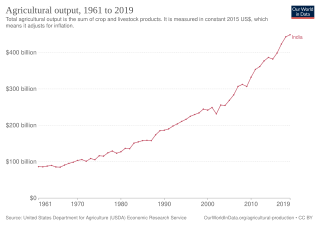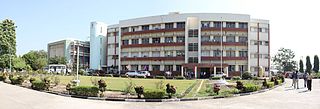
Millets are a highly varied group of small-seeded grasses, widely grown around the world as cereal crops or grains for fodder and human food. Most millets belong to the tribe Paniceae.

Pearl millet is the most widely grown type of millet. It has been grown in Africa and the Indian subcontinent since prehistoric times. The center of diversity, and suggested area of domestication, for the crop is in the Sahel zone of West Africa. Recent archaeobotanical research has confirmed the presence of domesticated pearl millet on the Sahel zone of northern Mali between 2500 and 2000 BC. 2023 was the International Year of Millets, declared by the United Nations General Assembly in 2021.

The International Crops Research Institute for the Semi-Arid Tropics (ICRISAT) is an international organisation which conducts agricultural research for rural development, headquartered in Patancheru, Hyderabad, Telangana, India, with several regional centres and research stations . It was founded in 1972 by a consortium of organisations convened by the Ford- and the Rockefeller- foundations. Its charter was signed by the FAO and the UNDP.

The history of agriculture in India dates back to the Neolithic period. India ranks second worldwide in farm outputs. As per the Indian economic survey 2020 -21, agriculture employed more than 50% of the Indian workforce and contributed 20.2% to the country's GDP.
Vaidhyanathaswamy Santhanam was an Indian cotton scientist who worked for the Food and Agriculture Organization of the United Nations as a long term resident expert for cotton and project leader in Myanmar. He had served as a short term consultant to Vietnam as well. He was chairman of the expert review team of the Southern India Mills Cotton Development and Research Association from November 2009 to March 2010. He was also the author/co-author of over 110 publications, including books and book chapters on cotton.
Telangana has multiple institutes of higher education universities along with numerous primary and secondary schools.

The ICAR - Central Tuber Crops Research Institute, often abbreviated as ICAR - CTCRI, is a constituent institute under the Indian Council of Agricultural Research (ICAR) is the only research organization in the world dedicated solely to the research on tropical tuber crops. The Institute established in 1963 with its headquarters at Thiruvananthapuram, Kerala has with an area of 48.19 hectares. The headquarters of ICAR - CTCRI is located at Sreekaryam at a distance 12 km away from Thiruvananthapuram International Airport and 10 km from Thiruvananthapuram Central railway station as well as Central Bus Station Thiruvananthapuram. The Institute has a regional centre at Bhubaneswar, Orissa established in 1976 with an area of 20 hectares located 8 km from Bhubaneswar Airport and 7 km from Bhubaneswar railway station to cater the needs of Eastern India.

The Indian Institute of Spices Research (IISR) is an autonomous organisation engaged in agricultural research related to spices in India. The institute has its headquarters in Moozhikkal, Silver Hills, Kozhikode, Kerala and is a subsidiary of Indian Council of Agricultural Research (ICAR), New Delhi, under the Ministry of Agriculture, India.

The Central Institute of Agricultural Engineering (CIAE) is a higher seat of learning, research and development in the field of agricultural engineering, situated in the lake city of Bhopal, Madhya Pradesh, India. It is an autonomous body, an Indian Council of Agricultural Research subsidiary, under the Ministry of Agriculture & Farmer's Welfare, Government of India.

The Indian Institute of Soil Science is an autonomous institute for higher learning, established under the umbrella of Indian Council of Agricultural Research (ICAR) by the Ministry of Agriculture, Government of India for advanced research in the field of soil sciences.
The Central Soil Salinity Research Institute (CSSRI) is an autonomous institute of higher learning, established under the umbrella of Indian Council of Agricultural Research (ICAR) by the Ministry of Agriculture, Government of India for advanced research in the field of soil sciences. The institute is located on Kachawa Road in Karnal, in the state of Haryana, 125 km (78 mi) from the Indian capital of New Delhi.

ICAR - Directorate of Groundnut Research (ICAR-DGR) formerly known as National Research Centre for Groundnut is a premier national level institute set up by the Indian Council of Agricultural Research, Ministry of Agriculture of India to cater to the needs of agricultural science research in the field of groundnut (peanut) crop in India. ICAR-DGR was established in 1979, Gujarat to give a fillip to research for enhancing productivity of groundnut in keeping with its importance among the oilseed crops of India. The research centre came into being as the first crop commodity research unit under the category of NRC's of the Indian Council of Agricultural Research, as an autonomous body set up as a registered society. The National Research Centre on Groundnut (NRCG) was elevated to the level of a Directorate in the year 2009 and rechristened as the Directorate of Groundnut Research.
Atmaram Bhairav Joshi was an Indian agricultural scientist and academic, known for his contributions to the field of wheat and other crop breeding. He was the vice-chancellor of Mahatma Phule Krishi Viswavidyalaya, Rahuri and the chairman of the Research Advisory Committee of the Indian Agricultural Research Institute, New Delhi. The Government of India awarded him the fourth highest Indian civilian award of Padma Shri in 1975.
Mangina Venkateswara Rao was an Indian agricultural scientist, plant breeder, and geneticist who was considered as one of the key figures in India’s Green Revolution. He was instrumental in increasing the productivity of wheat and oil seeds in India. He served as the Vice Chancellor of the Acharya N. G. Ranga Agricultural University, Deputy Director of the Indian Council of Agricultural Research (ICAR), and vice president of the National Academy of Agricultural Sciences. He received the Borlaug Award in 1993, and Padma Shri, India's fourth highest civilian award, in 1999.

Khem Singh Gill was an Indian academic, geneticist, plant breeder and Vice-Chancellor of the Punjab Agricultural University. He was known for his contributions to the Green Revolution in India. Instrumental for breeding new strains of wheat, linseed, and sesame, he was the author of the book Research on wheat and triticale in the Punjab along with several additional articles on the subject. He was also the vice-president of The Kalgidhar Trust and The Kalgidhar Society, Baru Sahib, which is one of the largest Sikh charities. A Sant Teja Singh Chair Professor in Sikhism of the Eternal Global University and a founding fellow of The World Academy of Sciences, he was a recipient of Rafi Ahmad Kidwai Memorial Prize, Team Research Award of the Indian Council of Agricultural Research (ICAR), FICCI Award, ICAR Golden Jubilee Award and Silver Jubilee Award of the Indian Society of Oilseeds Research. In 1992, the Government of India awarded him the third highest civilian honor of the Padma Bhushan for his contributions to science.

B Dayakar Rao is an Indian Agricultural Economics scientist, who works as Principal Scientist at the Indian Institute of Millets Research.
Neelamraju Ganga Prasada Rao was an Indian geneticist and plant breeder, known for his efforts in developing hybrid varieties of sorghum, which earned him the moniker, the Father of Hybrid Sorghum. He was the vice chancellor of Vasantrao Naik Marathwada Agricultural University and chaired the Agricultural Scientists Recruitment Board of the Indian Council of Agricultural Research. He was a recipient of several national honors including Rafi Ahmed Kidwai Award and the VASVIK Industrial Research Award. The Council of Scientific and Industrial Research, the apex agency of the Government of India for scientific research, awarded him the Shanti Swarup Bhatnagar Prize for Science and Technology, one of the highest Indian science awards, in 1966, for his contributions to biological sciences.
Smart Food is a global initiative led by the ICRISAT, a member of the CGIAR System Organization, and is jointly led with FARA, CORAF, FANRPAN and APAARI.
The Indian Institute of Soybean Research, Indore (ICAR-IISR) is an agricultural research institution located in Indore that focuses on basic and strategic research on soybeans.










